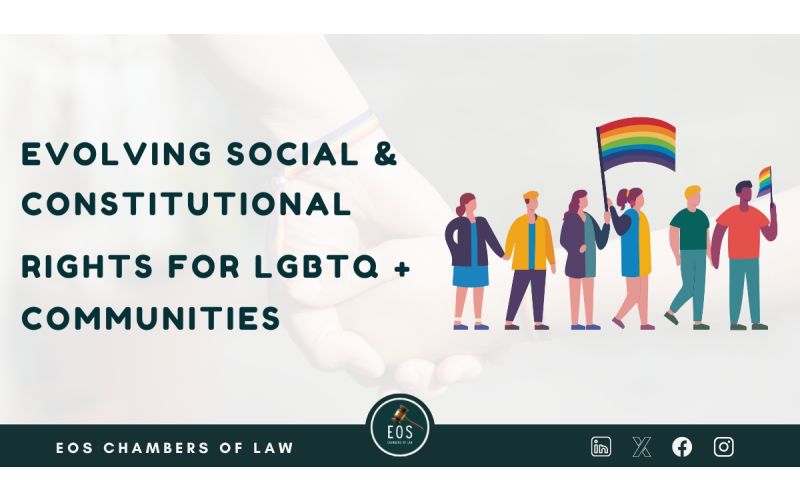Evolving Social and Constitutional Rights for LGBTQ+ Communi

Evolving Social and Constitutional Rights for LGBTQ+ Communities
The journey toward equality for LGBTQ+ communities in India has been marked by significant legal and social milestones. From the decriminalization of same-sex relationships to ongoing debates about marriage equality and adoption rights, the evolution of LGBTQ+ rights reflects the interplay between constitutional principles and societal progress.
Key Milestones in LGBTQ+ Rights:
- Decriminalization of Homosexuality (Navtej Johar v. Union of India, 2018):
The landmark Supreme Court judgment struck down Section 377 of the Indian Penal Code, decriminalizing consensual same-sex relationships. The court emphasized that the right to privacy and equality applies to all individuals, irrespective of their sexual orientation. - Recognition of Transgender Rights (NALSAR Case, 2014):
The Supreme Court’s ruling in National Legal Services Authority v. Union of India recognized transgender individuals as a third gender, affirming their right to self-identify and access affirmative actions such as education and employment quotas. - Anti-Discrimination Protections:
While India lacks comprehensive anti-discrimination laws for LGBTQ+ individuals, the courts have increasingly upheld their rights. Several state and local governments have issued guidelines to ensure inclusivity in workplaces and schools.
Constitutional Foundations of LGBTQ+ Rights:
- Equality and Non-Discrimination:
Article 14 (equality before the law) and Article 15 (prohibition of discrimination) form the bedrock of constitutional protections for LGBTQ+ individuals. - Right to Privacy:
Article 21 guarantees the right to life and personal liberty, interpreted to include privacy and dignity. The Puttaswamy v. Union of India judgment strengthened this principle, laying the foundation for further rights. - Freedom of Expression:
Article 19 protects the right of LGBTQ+ individuals to express their identities without fear of persecution.
Challenges and the Road Ahead:
Despite progress, several challenges persist:
- Marriage Equality:
Same-sex marriages are not yet legally recognized, limiting LGBTQ+ couples' access to marital rights like inheritance, taxation benefits, and spousal healthcare. - Adoption and Parenthood:
The legal framework does not fully recognize adoption by LGBTQ+ couples, creating barriers to family formation. - Social Acceptance:
Stigma and discrimination remain prevalent, particularly in rural areas, hindering the full realization of constitutional rights. - Workplace Inclusivity:
While corporate India has made strides in creating LGBTQ+ inclusive workspaces, a comprehensive anti-discrimination law is needed to ensure uniformity across sectors.
Global Inspiration:
Countries like Canada, South Africa, and the Netherlands provide robust legal frameworks for LGBTQ+ rights, including marriage equality and anti-discrimination laws. Their models can serve as benchmarks for India’s progress.
Conclusion:
The constitutional promise of equality and dignity must extend to all individuals, including LGBTQ+ communities. Legal advancements alone cannot achieve this; societal attitudes must evolve in tandem. Continued advocacy, judicial interventions, and public discourse are essential to bridge the gap between legal recognition and social acceptance.
As India progresses, embracing inclusivity and diversity will strengthen its democracy and reaffirm its commitment to human rights.
Post Categories
Featured Posts
Latest Posts
Latest Posts

Startups and Legal Compliance A Guide to Navigating Indian Laws...
Starting a business in India is an exciting journey filled with opportunities and challenges One critical aspect that often poses a challenge for startups is navigating the complex landscape of legal compliance Understanding and adhering to the various laws and...

Government trying to draft laws in simple manner and in Indian languages Pm Modi...
Prime Minister Narendra Modi emphasized the importance of lawyers and the judiciary in shaping the country's legal system Prime Minister Narendra Modi expressed his gratitude to the legal fraternity for their substantial contribution to the country's independence movement and its...

Insurance Companies Must Deal In A Bonafide Fair Manner Should Not Just Care For...
The Supreme Court observed that an insurance is expected to deal with the insured in a bonafide and fair manner and should not just care for and cater to its own profits It is the duty of the insurance company...

Supreme Court Sides With Madras HC Person Forwarding Social Media Messages Liable For Contents...
The Madras High Court had noted that Shekher was a person of high stature and had many followers It stated that he should have exercised more caution when forwarding messages The Supreme Court refused to entertain an appeal challenging Madras...

Digital Arrest Navigating Cyber Crime Laws in India...
In today's digital era the concept of digital arrest has taken center stage reflecting the evolving legal response to cyber crimes in India With the rise in online fraud hacking cyberbullying and identity theft the need to protect citizens and...

Hurried Trial' Supreme Court Sets Aside Death Penalty Given In Child Rape-Murder Case Within...
The Supreme Court on Thursday October set aside the conviction and death sentence of a man accused of kidnapping raping and murdering a three-month-old infant after noting that he had not been give a 'proper opportunity' to defend himself...

Speak With Our
Get a Appointment
















